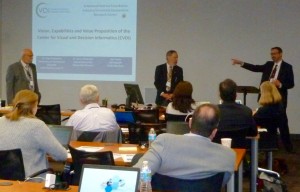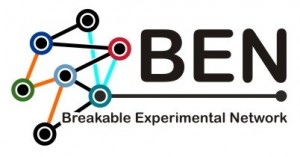 Carolina researchers, representatives of area
Carolina researchers, representatives of area
businesses, and program officers with the National Science Foundation met Dec. 2 and 3 at RENCI to discuss collaborative research opportunities and partnerships aimed at translating academic research into competitive value for business. The workshop focused on establishing a new research site at Carolina of an NSF-funded Industry/University Cooperative Research Center (I/UCRC) called the Center for Visual and Decision Informatics (CDVI). Based at the University of Louisiana at Lafayette, CDVI already has research sites at Drexel University in Philadelphia and Tampere University of Technology in Finland.
RENCI brings business and UNC researchers together for NSF-funded workshop
iRODS Consortium welcomes NICS at University of Tennessee as newest member at SC15
Consortium membership doubles since last Supercomputing Conference.
AUSTIN, Texas, Nov. 18, 2015 – The National Institute of Computational Sciences (NICS) at the University of Tennessee today became the 13th member of the iRODS Consortium, the membership-based foundation organized to sustain the integrated Rule-Oriented Data System (iRODS) as free open source data management software.
The newest consortium member was announced in the RENCI booth (#181) on the SC15 show floor at the Austin Convention Center.
Software Defined Networking gives BEN a boost
 Breakable Experimental Network (BEN) is now faster and SDN-enabled
Breakable Experimental Network (BEN) is now faster and SDN-enabled
CHAPEL HILL, NC, November 10, 2015 – A collaboration between researchers at RENCI and the University of Houston means that RENCI’s Breakable Experimental Network (BEN) will be faster and easier to use for scientists with data intensive research problems to solve.
ExoGENI featured in SCinet Network Research Exhibition demos
 AUSTIN, TEXAS – Each year the SC conference, the annual gathering of industry and research experts in high performance computing, networking, storage and analysis, sets up one of the most powerful and advanced networks in the world: SCinet.
AUSTIN, TEXAS – Each year the SC conference, the annual gathering of industry and research experts in high performance computing, networking, storage and analysis, sets up one of the most powerful and advanced networks in the world: SCinet.
UNC-Chapel Hill’s RENCI and Georgia Tech to Lead Major Effort that Applies Big Data Solutions to Challenges Faced in North Carolina and the South
Buried in troves of data that scientists have gathered, but not yet analyzed, could be key insights to improving health care disparities, coastal hazards, and urban planning in the southern United States.
(Chapel Hill, N.C. – Nov. 2, 2015) — The University of North Carolina’s Renaissance Computing Institute (RENCI) and Georgia Institute of Technology will co-direct a new, national effort that is unprecedented in scope to develop a big data innovation hub serving 16 southern states and the District of Columbia. The hub will have dual locations in Atlanta and Chapel Hill, with co-executive directors who will be accountable to hub partners.
New study suggests hallucinations, alone, do not predict onset of schizophrenia
An analysis of psychological symptoms aims to refine diagnostic criteria for teens at high risk of developing the brain disorder that affects millions of people worldwide.
CHAPEL HILL, NC – Despite decades of study, schizophrenia has remained stubbornly difficult to diagnose in its earliest, prodromal stage. A new analysis led by researchers at the UNC School of Medicine and Renaissance Computing Institute identifies illogical thoughts as most predictive of schizophrenia risk. Surprisingly, perceptual disturbances, the forerunners of hallucinations, are not predictive, even though full-blown hallucinations are common features of schizophrenia. The results were published online today in the journal Schizophrenia Research. Read more
Workshop shows that data matters at Carolina
When you put more than 50 faculty members, center directors, and researchers from 30 different campus units in a room, ideas are inevitable. However, all the attendees at the Data@Carolina Workshop last week agreed on one point: The explosion of data presents educational and research opportunities across the Carolina community, and Carolina must take a strategic approach to capitalize on these opportunities.
RENCI, NC State receive NSF funding for smart grid communications development
The National Science Foundation recently announced plans to award nearly $12 million to US Ignite, as part of the new White House “Smart Cities” Initiative, which will provide funding to projects and organizations developing next-generation Internet applications.
One of the projects that will benefit from the new funding is a joint effort involving RENCI, North Carolina State University, and the Rochester Institute of Technology to develop an advanced design architecture that will integrate cloud computing and next-generation communication networks with wide-area control of large power systems based on Synchronized Phasor Measurements, or “Synchophasors.”



